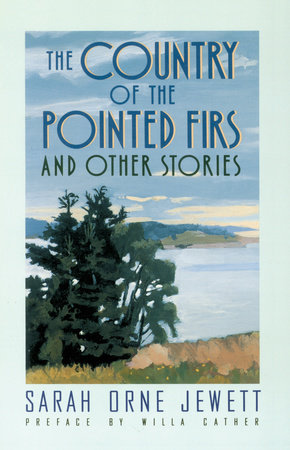My new wife and I recently went on our mini-moon to Portland, Maine, a lovely but cold town set on the rocky New England coast and ringed with islands. I've been saving this book for the next time I was in Maine, and as far as local color goes, it didn't disappoint: Jewett's account of a small coastal town in Maine certainly feels unmistakably like a product of its own place and time, as closely tied to its setting as Twain's novels are to the Mississippi River.
The unnamed protagonist of The Country of the Pointed Firs is an older woman writer--probably very closely identified with Jewett herself--who summers in the town of Dunnet Landing, where she rents out an abandoned schoolhouse for her writing and becomes fast friends with another woman named Almira Todd, who is an expert in growing medicinal herbs. The book unfolds over several summers, as the protagonist gets to know the local denizens of Dunnet Landing better little by little, as well as Almira's simple but loyal family, who live out on one of the harbor islands. Jewett has a sensitive eye for the habits and personalities of the Mainers of the 19th-century people: proud but unpretentious, friendly but insular, with a propensity for sea travel (they rely on a fishing economy, after all) but unfamiliar with places fifteen miles away by land.
This novel was a challenge for me. It flouts one of the principles of fiction we hold to be most inviolable: it really has nothing resembling a conflict. The people of Dunnet Landing undergo hardships, of course; they've buried loved ones and endured harsh winters, which they bear with equanimity, but these things are rarely represented in the narrative. The protagonist and Almira are friendly with just about everyone; you get the sense that small-town people can't afford to be enemies. In place of conflict is a series of detailed sketches of Maine life that illuminate the richness in everyday life even as they zero in on characters who are, for lack of a better word, "quirky."
My favorite comes late in the book, when Almira and the protagonist visit a reclusive woman known as "The Queen's Twin," because she shares a birthday with Queen Victoria. There's a tremendous pathos in the image of the woman, living alone in the Maine woods, but imagining a kind of friendship with a powerful woman across the Atlantic:
"Sometimes I think, now she's older, she might like to know about us. When I think how few old friends anybody has left at our age, I suppose it may be just the same with her as it is with me; perhaps she would like to know how we came into life together. But I've had a great advantage in seeing her, an' I can always fancy her goin' on, while she don't know nothin' yet about me, except she may feel my love stayin' in her heart sometimes an' not know just where it comes from. An' I dream about our being together out in some pretty fields, young as ever we was, and holdin' hands as we walk along."
And yet Jewett is as interested in the walk to the Queen's Twin's house as she is what in what happens there, and lingers for pages and pages over the landscape and the untroubled path of the two visiting friends. Most of the characters in the novel are women, and older women at that, and the uncomfortable dramalessness of it may reflect a particular mode of existence circumscribed for women in 19th century America. But I admit to being frustrated by it, and being most interested in the novel when it rises above the quotidian, as with a chilling early tale from a Sea Captain who describes, from secondhand accounts, a terrifying Arctic world of strange shadow-creatures. It sets a strange tone for the novel that it never returns to, or validates.
My copy of the novel is accompanied by several short stories, most of which tell similar stories about older women visiting older women. Most of them I have forgotten completely, but a couple stand out: "The White Heron," about a young girl's awakening to the natural world around her in contrast to the rapaciousness of a visiting hunter, and "The Hiltons' Holiday," whose story of a pair of young girls visiting the town for the first time just stands out as being unerringly charming (and which reminds me of a similar account, accompanied by more menace, in Independent People). But by the time I'd put the book down, I'd had enough of charm, and of local color.


No comments:
Post a Comment